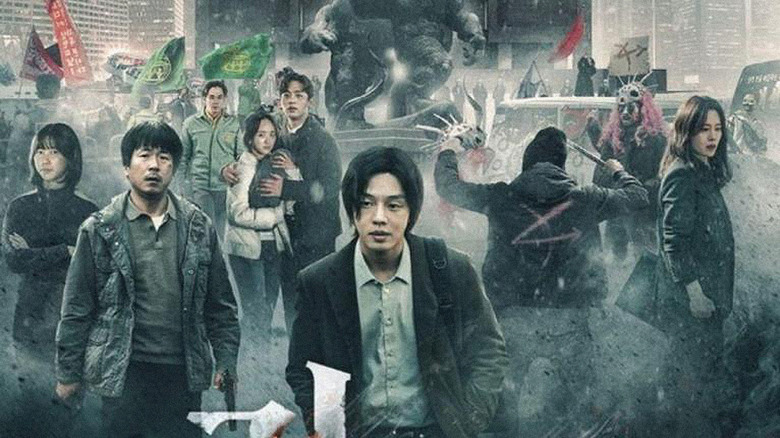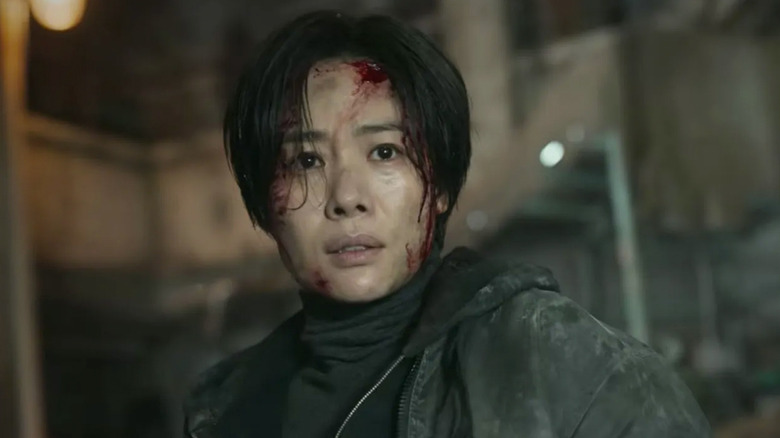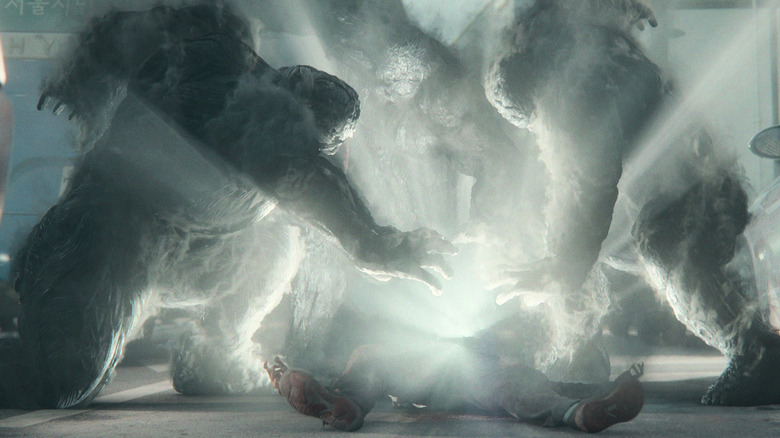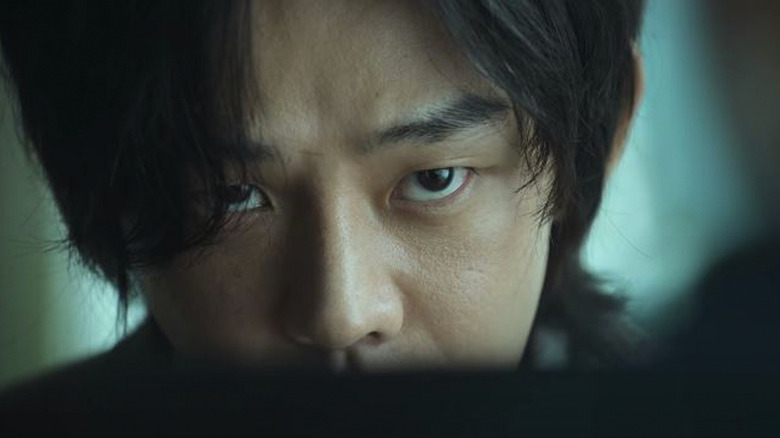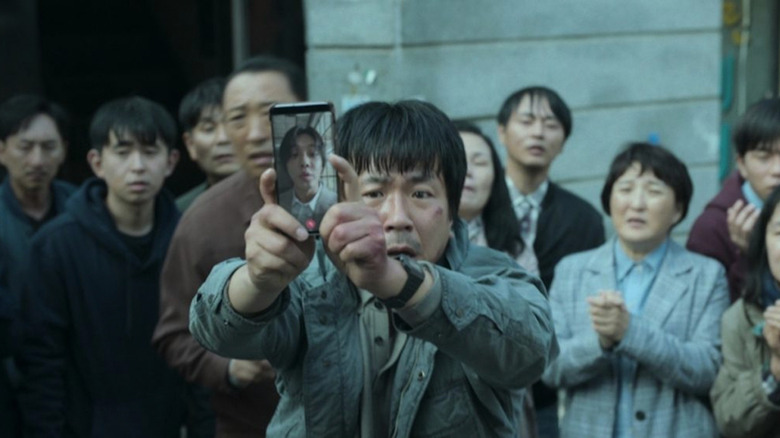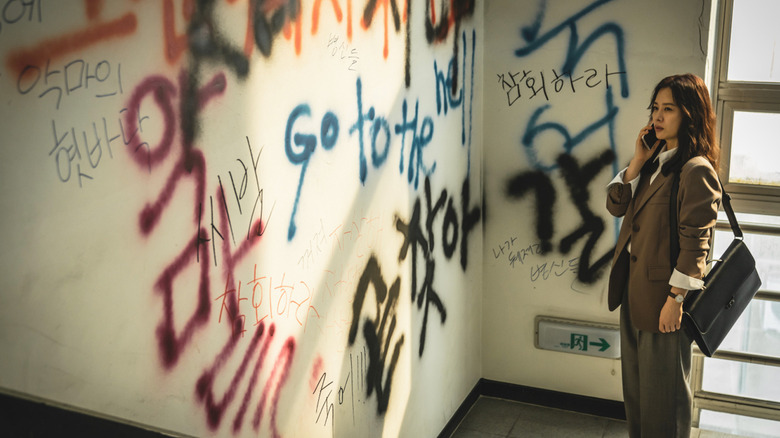5 Reasons Squid Game Fans Should Watch Hellbound
2021 was quite the year for Korean media. The demand for South Korean shows, music and movies has grown exponentially over the years, with critically-acclaimed films like "Oldboy," "Parasite," and "Train to Busan" drawing more allure to the industry than ever before. That appeal only compounded with the viral success of Netflix's "Squid Game," which introduced the concept of the k-drama to millions more. Hwang Dong-hyuk's sadistic spin on children's playground games is paving the way for other dramas to find similar success — and that can't be more true than for "Hellbound," a new supernatural horror produced by Netflix.
"Hellbound" is the latest from Yeon Sang-ho, the acclaimed director of "Train to Busan." The series, adapted by Yeon and Choi Kyu-sok from their webtoon "The Hell," unleashes a gruesome new reality onto the citizens of Seoul. When people are visited by angels who prophesize their death down to the second — and a group of demons called Executors arrive to send them straight to hell — it fortifies the claims of two burgeoning religious groups. While one, the New Truth, is focused on relaying God's will to sinners, the other, Arrowhead, encourages violence and intimidation to enforce it.
The series pushed "Squid Game” to No. 2 on the list of Netflix's most popular titles, and it's fast on its way to becoming the next big international hit from South Korea. Although the shows are entirely different in premise and execution, fans of "Squid Game" will naturally be drawn to Netflix's new release. But how similar are these two titles, and will "Hellbound" fill the shoes of the streaming giant's biggest hit?
The Stars Are Just as Important as the Story
South Korean cinema rarely sacrifices performance for spectacle. Many K-dramas are inspired by cosmic themes, but they are always anchored by some of the country's best talent. This was more than evident in "Squid Game," which featured Lee Jung-Jae, one of the country's longest-working stars. Even less well-known actors like Park Hae-soo and Jung Ho-Yeon — who had only modeled before "Squid Game" — brought considerable heft to their craft.
True to form, "Hellbound" features incredible performances from its entire cast. While the genre-bending plot is a big perk of the series, it's also chock-full of nuanced characters that ground its supernatural themes. Yoo Ah-In, star of the searing thriller "Burning," plays the charismatic leader of the New Truth, Jeong Jin-soo. While there are some undeniably cult-y vibes, Yoo weaves a carefully-concealed anguish into the character's every move. You can't help but feel a curious sympathy for Jin-soo, even as he condemns the sinners around him.
Actress Kim Hyun-joo is arguably the heart of the series. It is through her character, attorney Min Hye-jin, that viewers find the real horror of "Hellbound." It's not the angels or the demons permeating the real world and doling out indiscriminate judgment, but the men who turn into monsters when they see fit to play God.
The Gore Makes "Hellbound" a Perfect Horror
Fans of the gore on display in "Squid Game" will feel they've stepped into an entirely new world with "Hellbound." Where the former's violence was more focused on action, "Hellbound" takes it all a step further by incorporating vengeful demons and bloodthirsty religious factions. The pilot episode's very first scene introduces viewers to the enforcers sending sinners directly to hell in broad daylight — to jaw-dropping effect. Each decree that follows for a new sinner invites a sense of dread. Then again, should viewers expect anything less from Yeon Sang-Ho, the director of "Train to Busan"?
Not Everything Is As It Seems
Drama series are best when a simple conflict unravels into a multi-faceted threat. In "Squid Game," what started as a deadly game that pit competitors against each other quickly expanded to reveal dozens of different conflicts. The dynamic between the game's participants and their captors, the participants themselves, and even the higher-ups supervising the game delivered surprises in each episode.
It's the same for "Hellbound." Though the series opens with a helpless sinner's fight to survive a demonic attack, the episode quickly shifts gears to establish the other key players searching for answers. That first scene, while undoubtedly burned into the backs of viewer's minds, sets the stakes high for the characters introduced later. As they grapple with disparate ideas about belief, faith and fanaticism, they're also racing against time to stop the gruesome murders all around them.
Both Offer Great Societal Commentary
South Korean cinema is well-known for its complex exploration of national anxieties. Director Bong Joon-ho, who garnered critical acclaim with his film "Parasite," has been weaving allegories about class and greed into his films for years. "Squid Game" focused on a modern dystopian society, and the circumstances that drive most people to desperation. And while "Hellbound" is set in a much more apocalyptic environment, the horror echoes along similar themes.
Aside from corruption and class disparities, South Korean filmmakers have been addressing religious controversy in their work as the number of questionable religious groups in the country begin to rise. South Korea has had a history with cult-like organizations, and some religious sects have been connected to tragedies like the Sewol Ferry disaster in 2014. "Hellbound" keeps things general with its depiction of the New Truth and it's splinter faction, Arrowhead, but the series deftly articulates the superiority complexes that can arise in the self-righteous.
Society's current fascination with cancel culture, brought on by reliance on social media and streaming platforms, serves as a huge conflict throughout "Hellbound." The New Truth insists that prophecies are only given to people with egregious sin, and anyone who opposes the theory is silenced by the church's devout followers. As more and more Executors carry the guilty off to hell, it also adds fuel to Arrowhead's condemning platform. The conversation shifts quickly from why these prophecies have increased in frequency, to what the victims did to deserve it, resulting in a vicious invasion of privacy for the people who receive their own decrees. This grates against the question of autonomy and free will posed by Hye-jin, who tries to help the victims of the Executors as best she can.
It's a Great Way to Delve Deeper Into South Korean Film
"Squid Game" created a massive new interest in k-dramas, as well as the actors that star in them. This new surge in popularity aligns with the sentiment that many have been echoing for years: Great entertainment is out there, if only hindered by subtitles. "Train to Busan" was Yeon Sang-ho's breakout hit, and the director-writer of "Hellbound" has been quietly churning out content ever since. He released two works to accompany his zombie horror: an animated prequel called "Seoul Station," and a bonkers unofficial sequel, "Peninsula."
Yeon has since gushed about "Hellbound" star Yoo Ah-In, revealing that Yoo's part in the series was written with him in mind. The actor is well-known in Korea already, but if "Hellbound" truly reaches "Squid Game" levels of popularity, it could catapult both he and his co-stars to global recognition as well. In the meantime, "Hellbound" fans could check out some of Yoo's other work: "#Alive" follows a livestreamer who locks himself in his apartment to survive a fast-spreading virus. For those looking for more gripping street-level violence and female characters like Hye-Jin, there's the revenge drama "My Name," which stars up-and-comer Han So-hee. Fans of Park Jeong-min, who played the journalist Bae Young-jae in "Hellbound," should check out "Time to Hunt," a film that also features Park Hae-soo from "Squid Game."
